Introduction
Betta fish, also known as Siamese fighting fish, are among the most popular freshwater fish for home aquariums. Their vibrant colors and flowing fins make them a favorite among aquarists. However, understanding the behavior of Betta fish is crucial to ensure they thrive in their environment. This comprehensive overview will guide you through the various aspects of Betta fish behavior, helping you become a more informed and attentive fish owner.
What Are Betta Fish?
Origin and Habitat
Betta fish are native to the shallow waters of Thailand, Cambodia, and Vietnam. They are commonly found in rice paddies, slow-moving streams, and stagnant ponds. This natural habitat influences their behavior, particularly their ability to survive in low-oxygen environments thanks to their labyrinth organ, which allows them to breathe air from the surface.
Physical Characteristics
Betta fish are known for their striking appearance. Males, in particular, display a wide range of colors, including red, blue, green, and purple. They have long, flowing fins that make them stand out in any aquarium. Females, while less colorful, also exhibit beautiful hues and shorter fins. Understanding these physical traits helps in identifying health and mood changes in your Betta.
Betta Fish Behavior: An Overview
Natural Instincts
Betta fish are naturally inquisitive and active. They love exploring their environment and often interact with objects within their tank. Providing them with a stimulating environment can help keep them engaged and happy.
Social Behavior
While Betta fish are solitary by nature, they do exhibit social behaviors, particularly in mating and territorial disputes. Understanding these behaviors is key to creating a harmonious environment, especially if you plan to keep multiple fish in one tank.
Aggression in Betta Fish
Territorial Nature
One of the most well-known aspects of Betta fish behavior is their aggression, especially in males. They are highly territorial and will fiercely defend their space from other males. This aggression is a natural instinct, stemming from their need to establish dominance in their habitat.
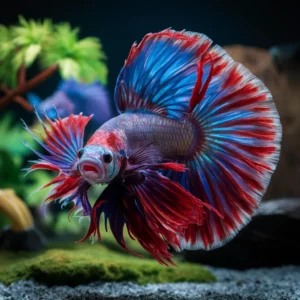
Recognizing Aggressive Behavior
Aggressive Betta fish will flare their gills, spread their fins, and display their brightest colors to intimidate rivals. They may also engage in chasing and nipping. If you notice these signs, it’s crucial to separate the fish to prevent injury.
Mating and Courtship
Mating Rituals
Betta fish have fascinating mating rituals. Males build bubble nests at the water’s surface, where they will entice females to spawn. The courtship involves a dance where the male wraps his body around the female to fertilize the eggs as she releases them.
Nest Building
After mating, the male takes on the responsibility of placing the fertilized eggs into the bubble nest and guarding them until they hatch. This behavior underscores the importance of providing a suitable environment for breeding Betta fish.
Betta Fish Communication
Visual Signals
Betta fish communicate primarily through visual signals. Their color changes and fin displays convey various messages, from aggression to readiness to mate. Observing these signals can help you understand their mood and intentions.
Body Language
In addition to color changes, Betta fish use body language to communicate. Subtle movements, like a flick of a fin or a change in swimming patterns, can indicate stress, curiosity, or aggression. Paying attention to these cues is essential for maintaining a healthy tank environment.
Feeding Behavior
Diet Preferences
Betta fish are carnivorous and prefer a diet rich in protein. In the wild, they feed on insects and larvae. In captivity, they thrive on high-quality pellets, frozen or live foods like brine shrimp and bloodworms.
Feeding Patterns
Betta fish should be fed small amounts once or twice a day. Overfeeding can lead to health problems and water quality issues. Observing their feeding behavior can help you gauge their appetite and overall health.
Stress Indicators in Betta Fish
Common Signs of Stress
Stress in Betta fish can manifest in various ways, including loss of color, lethargy, and erratic swimming. Other signs include clamped fins and a lack of appetite. Identifying these signs early can prevent more serious health issues.
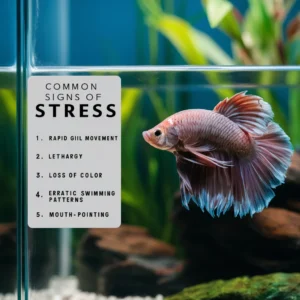
Causes of Stress
Several factors can cause stress in Betta fish, such as poor water quality, inadequate tank size, and aggressive tank mates. Ensuring a stable environment with proper water conditions and enough space can significantly reduce stress levels.
Health and Wellness
Common Health Issues
Betta fish are susceptible to several health issues, including fin rot, ich, and swim bladder disorder. Regular monitoring and maintaining optimal tank conditions are crucial for preventing these ailments.
Preventative Care
Preventative care for Betta fish includes regular water changes, proper diet, and avoiding overfeeding. Additionally, quarantine new fish before introducing them to the tank to prevent the spread of diseases.
Interaction with Other Fish
Compatible Tank Mates
While Betta fish are known for their aggression, they can coexist with certain species. Suitable tank mates include snails, ghost shrimp, and some peaceful fish like neon tetras and guppies. Always monitor interactions to ensure harmony.
Incompatible Tank Mates
Avoid housing Betta fish with other aggressive species or those with long fins, which can trigger Betta’s territorial instincts. Fish like cichlids and other Betta males should be kept separate to prevent conflicts.
Environmental Influences on Behavior
Tank Size and Setup
A proper tank setup is vital for Betta fish health and behavior. A minimum of 5 gallons is recommended for a single Betta, with plenty of hiding spots and plants to mimic their natural habitat. Avoid sharp objects that can damage their delicate fins.
Water Quality and Temperature
Betta fish thrive in warm water, ideally between 76-82°F. Regular water changes and filtration help maintain water quality. Monitoring pH levels and ensuring the water is free from chlorine and heavy metals are also essential.
here how you can maintain betta healthy fish tank
Training Betta Fish
Basic Training Techniques
Betta fish can be trained to perform simple tricks, such as following your finger, jumping for food, or swimming through hoops. Positive reinforcement with treats and consistent training sessions are key to successful training.
Benefits of Training
Training not only provides mental stimulation for Betta fish but also strengthens the bond between you and your pet. It can also make feeding and tank maintenance easier as your Betta becomes more accustomed to human interaction.
Betta Fish Myths and Misconceptions
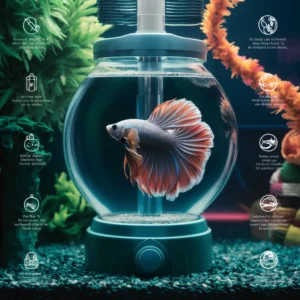
Debunking Common Myths
There are many myths surrounding Betta fish care, such as the belief that they can live in tiny bowls without heaters or filters. In reality, Betta fish require adequate space, proper filtration, and stable temperatures to thrive.
Understanding Betta Fish Reality
Understanding the true needs and behaviors of Betta fish helps ensure they live long, healthy lives. Dispelling misconceptions allows you to provide a better environment and care for your fish.
Caring for Betta Fish
Daily Care Routine
A daily care routine for Betta fish includes feeding, checking water parameters, and observing their behavior for any signs of stress or illness. Regular maintenance keeps your Betta healthy and your tank clean.
Long-term Care Tips
Long-term care involves periodic water changes, maintaining a stable environment, and providing a balanced diet. Monitoring your Betta’s health and adjusting care as needed ensures they live a full, vibrant life.
Conclusion
Understanding the behavior of Betta fish is essential for providing the best care and ensuring their well-being. From recognizing aggression and mating behaviors
to maintaining optimal tank conditions, every aspect of Betta care contributes to their health and happiness. By staying informed and attentive, you can create a thriving environment for your Betta fish.
FAQs
How can I tell if my Betta fish is happy?
A happy Betta fish will display vibrant colors, actively swim around the tank, and show interest in its surroundings. It will also eat regularly and engage in playful behaviors.
What should I do if my Betta fish is aggressive?
If your Betta fish displays aggression, consider separating it from other fish and providing a larger tank with plenty of hiding spots. Reducing stress factors and ensuring proper tank conditions can also help.
Can Betta fish recognize their owners?
Yes, Betta fish can recognize their owners. They may swim to the front of the tank and show excitement when you approach, especially during feeding times.
What are the best tank conditions for Betta fish?
The best tank conditions for Betta fish include a minimum of 5 gallons of water, a stable temperature between 76-82°F, proper filtration, and plenty of plants and hiding spots to mimic their natural habitat.
How often should I feed my Betta fish?
Feed your Betta fish small amounts once or twice a day. Overfeeding can lead to health issues and poor water quality, so it’s essential to stick to a regular feeding schedule.

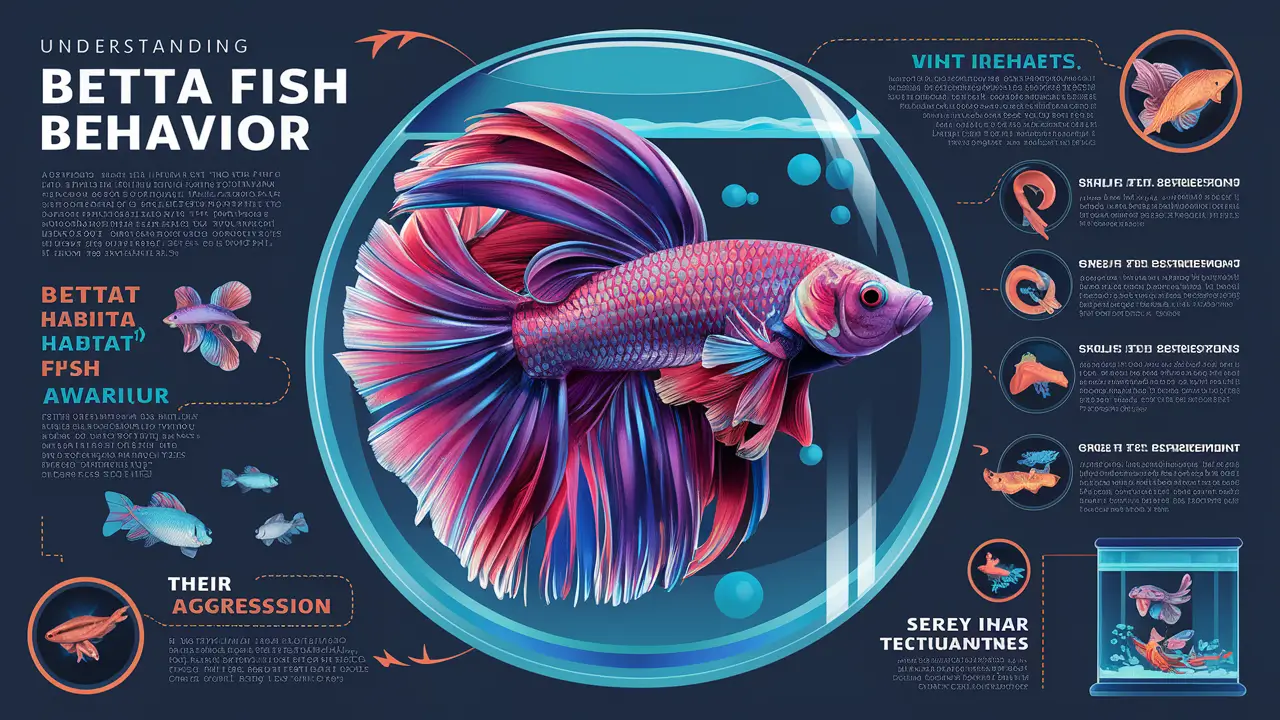



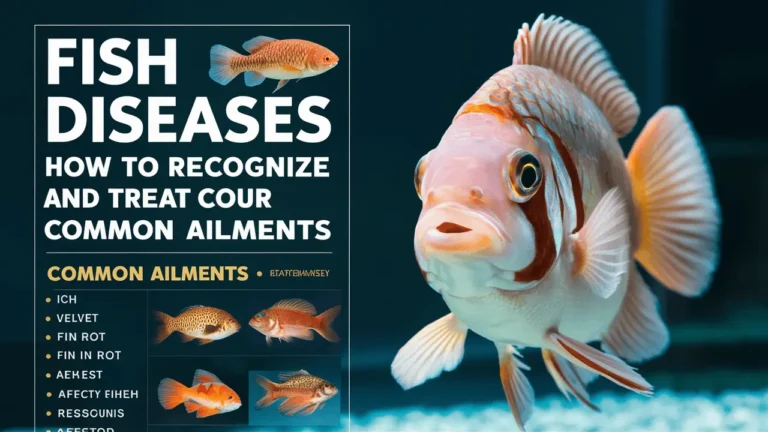

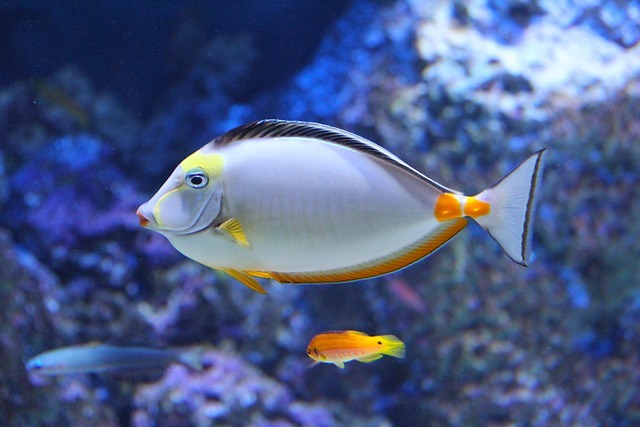
Thank you for your sharing. I am worried that I lack creative ideas. It is your article that makes me full of hope. Thank you. But, I have a question, can you help me?
Thanks for sharing. I read many of your blog posts, cool, your blog is very good.
I don’t think the title of your article matches the content lol. Just kidding, mainly because I had some doubts after reading the article.